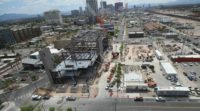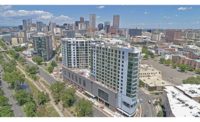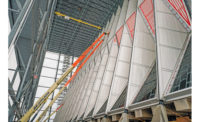Founded in 1976 by two union carpenters—Frank Martin and Frank Harris—Las Vegas-based general contractor Martin-Harris Construction considers its first priority to be the well-being and success of its 353 employees.
“We find our success in the bottom line of our company, not the top line,” says Guy Martin, president, who assumed leadership of the firm from his father four years ago. “Our motto is: ‘Have fun, make money,’ in that order.”
Martin gets a company update every Monday morning, and as part of that, he insists on knowing if anyone has been injured. If so, he calls the employee’s family to ensure the injured worker is being taken care of.
“We build people through our projects,” Martin says. “We make sure our people are very successful during this season in their life, and we want them to view this time [at Martin-Harris] as a blessing in their career.”
Support for its employees is matched by the firm’s attention to the needs of its clients. While Martin-Harris operates throughout the Southwestern U.S. (Nevada, Arizona, California, New Mexico and Texas), providing design-build, CMAR, design-assist and design-bid-build services in a wide variety of market sectors, “we never travel to a location [from which] we cannot get home office support within four hours,” Martin says.
Diverse Portfolio
The firm’s market-sector expertise includes health care, industrial, office, education, multifamily, special use, hospitality, public works and retail projects. And despite calling Las Vegas home, the contractor doesn’t depend on the city’s hospitality corridor or the Strip for its revenue.
“We love working off the Strip in the light commercial and industrial sector and always have two or three schools we’re building. That diversity is what allows us to work so nimbly through the changing environment,” Martin says.
“We build a lot of apartments and hotels and bring lean principles and innovation to those projects.”
– Paul Toplak, COO, Martin-Harris
The firm divides its work into three books of business. The contractor’s core business group ranges from multifamily to industrial warehouses, parks, schools and churches—projects that typically range from $3 million to $80 million in size. Current examples include the Adobe at Red Rock, a $42-million, four-story, 308-unit apartment building in Las Vegas and The Degree, UNLV University Park Student Housing, a $26-million, five-story, wood-framed student housing complex with 226 units.
The firm’s major projects group tackles unique work outside key market centers. While these projects are not always large, they are often focused on complexity. “This group is a collection of assets we deploy very strategically,” Martin explains. The major projects group is currently building the Las Vegas Convention Center Phase II Expansion, working in a joint venture with Turner Construction as part of a $2.1-billion program. It also is building the 140,000-sq-ft Las Vegas municipal courthouse through a $56.3-million public-private partnership.
Meanwhile, a special projects group tackles jobs with a high-intensity, short-duration focus, including renovations and tenant improvements in all market sectors. Recently, the group completed repeat work within casinos for Wynn, The Palazzo and Park MGM, as well as work at McCarran International Airport and LAX and health care projects for UMC and Sunrise Hospital.
“Folks on these projects thrive in that environment,” Martin says. With more than 100 projects a year in the special projects category, the group accounts for $40 million to $60 million in annual revenue.
“We build a lot of apartments and hotels and bring lean principles and innovation to those projects,” Martin-Harris COO Paul Toplak says. “And we partner with our subcontractors to raise the bar. It’s very fulfilling. We feel this is an area where our firm has more time and patience and has impacted the industry in a positive way.”
Navigating Change
When the pandemic forced companies to begin working remotely, Martin-Harris went from a 30% remote workforce to 91%. “Nobody was braced for this,” Martin says. “This either inspired or paralyzed [contractors]; in true Martin-Harris form, it inspired us, and our people continue to do whatever it takes.”
Nevada has lately relaxed its social-distancing restrictions, and the contractor is fully open today with key protocols in place. To prepare for this “new normal,” the firm conducted a thorough office reopening program phased over a three-week period.
The contractor treated its office like a jobsite, performing a job-hazard analysis and taking steps to eliminate or mitigate risks. OSHA and CDC preventative measures were applied to hallways, coffee stations, restrooms and the reception area. “Any place where social distancing is not practical or guaranteed, we treated as a job hazard and wrote a plan for it,” Martin says.
A one-hour vacancy is mandated for rooms between meetings, every horizontal surface is cleaned and disinfected and the mechanical system is allowed enough time to recover. Firm leaders held virtual meetings to train all 90 office staff members on potential hazards.
“Our first concern was how to keep people safe,” Toplak says. “Our second concern was keeping them employed.” When Martin-Harris was unable to locate portable hand-washing stations for jobsites, the contractor came up with a plan to build them, and then shared that process with industry peers.
“The pandemic has confirmed our commitment to our people and our partners. It has reinforced that we need to be leaders,” Toplak adds. “As the world changes, we are figuring out how to be at the forefront of that change.”
Martin served on the Nevada governor’s commission to help the state work through how to keep construction as an essential activity during the pandemic shutdown. “We were able to share our ideas and strategies with the governor’s office and OSHA to keep our tradesmen and women working and safe,” he says.
He sees the pandemic changing the industry in two major ways. First, in what he calls the short game: “tenant improvements, strip malls—any project in which the owner is relying on cash flow from their business’ service to pay for this are being deferred.”
“It’s a pure economic impact that will correct itself as quickly as the work sector comes back,” he says.
On the flip side, any projects that can be bid, built and commissioned within a nine-month period are not seeing much of an impact. “We have a robust schedule and backlog. Money is still out there and flowing,” Martin adds. “The greatest challenge is that developers outside of Vegas are hampered by travel restrictions and can’t physically get here right now. They’ve just hit pause; they haven’t changed their plans.”
The Human Element
As a nod to its ongoing push for workforce diversity, more than 40% of Martin-Harris Construction’s workforce is part of the millennial generation. The firm also has partnered in the creation of a STEM 101 curriculum for industry training and education and expanded the program’s educational reach to include the Las Vegas Dept. of Youth Development and Social Innovation.
“They aren’t just a general contractor; they’re a partner,” notes Keith Earnest, executive vice president of VanTrust Real Estate, a frequent Martin-Harris client that has built more than 4 million sq ft of industrial warehouse and fulfillment projects with the firm since 2016.
“Today’s warehouse is not just a guy cruising around on a forklift,” Earnest notes. “It takes a Martin-Harris contractor to be able to execute these [more elaborate] buildings.”
Martin-Harris recently completed Sephora’s regional distribution center in North Las Vegas, a $37-million, 713,366-sq-ft, tilt-up industrial building that features an employee-centric warehouse. The contractor worked in tandem with the client to ensure a human-friendly space with large break rooms, spacious rest areas, a snack bar and kitchen that make the warehouse feel more like an office environment.
“Paying attention to the human element started with Guy’s dad, Frank, and that comes through in their work in the field, how they communicate with customers, and the positive impact they make in the community,” Earnest says. “The Martin-Harris team was with us every step of the way as we developed over 4 million square feet in less than four years. Their attention to detail and focus on customer satisfaction really sets them apart.”










Post a comment to this article
Report Abusive Comment